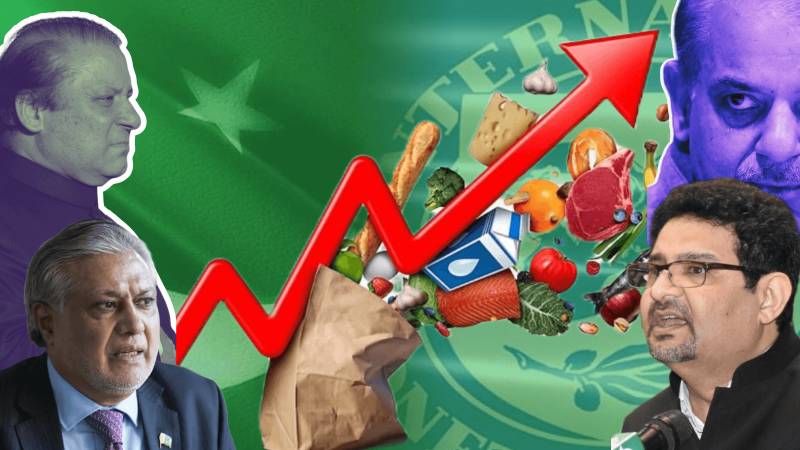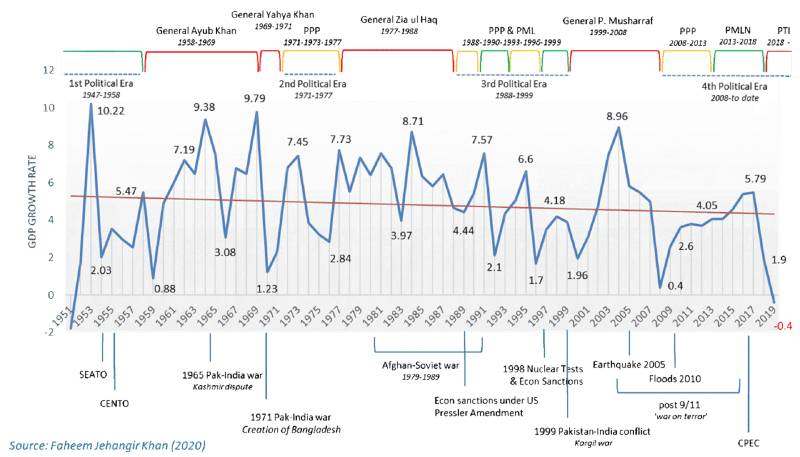
Deposed prime minister Nawaz Sharif has arrived in Pakistan after spending four years in exile. Delivering a highly-anticipated speech to a massive crowd at Lahore's Minar-e-Pakistan, he wasted no time in directly addressing one of the most pressing issues for the common Pakistani: inflation. He shed light on the nation's economic difficulties and expressed his party's unwavering commitment to the welfare of the people.
Looking ahead to the upcoming elections, Sharif presented a narrative that emphasised his party's deep understanding of the country's affairs and the economic challenges which citizens face. In this regard, he outlined a comprehensive agenda which includes reducing expenses, enhancing governance, boosting exports, and implementing vital reforms. Additionally, Sharif underscored the importance of maintaining positive relations with neighbouring countries.
However, his ability to deliver on the economic front remains highly questionable, especially when during the whole proceedings, former finance minister and the founder of the 'Daronomics' school of economic thought, Ishaq Dar, stood meekly by his side.
Unlike the past, Sharif has a unique set of challenges this time around. But if you heard him on Saturday evening, he also has the CV to pull something like this off. No wonder he made repeated mentions of it during his speech. However, scant mention was made of the economic havoc and gross mismanagement during the 16-month rule of the Pakistan Democratic Movement (PDM) coalition led by his younger brother, Shahbaz Sharif, in his address. There was a slight mention where he clarified he was not defending his brother's government.
To Sharif’s credit, he has shown both willingness and, at times, ability to deliver in challenging economic situations
The Savior
Although Nawaz Sharif attempted to distance himself from the events of the past year and a half, it is evident that the economic decisions made by the PDM government were heavily influenced by his guidance.
The PDM government inherited a struggling economy that was facing a liquidity crisis after a two-year economic upswing that began in 2020. This situation was worsened by external shocks caused by the Russia-Ukraine war, resulting in increased energy and food import costs for Pakistan. Furthermore, the government had the task of salvaging an ongoing International Monetary Fund (IMF) programme, which former Prime Minister Imran Khan had sought to undermine when his removal from office became inevitable.
Former finance minister and a former member of the PML-N, Miftah Ismail, has highlighted on several occasions how the PTI government, despite restarting the critical IMF programme in December 2021, chose to prioritise political interests over national interests. This led to unfunded subsidies for electricity and petrol, as well as providing amnesty to businesses, jeopardising Pakistan's IMF programme. However, Miftah and his efforts to reverse energy subsidies faced delays due to concerns within his party, which were influenced by the stance of Nawaz Sharif.
This was just one of many decisions that Miftah wasn’t given the autonomy to take due to continuous dictation from London. Eventually, he was replaced with Dar, who arrived with his familiar rhetoric of controlling the exchange rate and refusing to take dictation from the Fund. This sparked a nine-month-long game of cat and mouse with the IMF, during which Ishaq Dar had to concede on his demands while the Fund held firm on most of its primary requests.
The economic failures of the PDM government have been extensively discussed and do not necessitate additional explanation. However, returning to the subject of Sharif’s portrayal as the saviour of the economy, many of the statements made during his address might end up being mere lip service.
If Nawaz Sharif is successful in securing a victory in the upcoming general elections and assumes office as prime minister for the fourth time, he will face a daunting set of economic challenges that need to be addressed. The primary concern would be to secure a long-term International Monetary Fund (IMF) programme as the existing Stand-By Agreement expires in March - just weeks after elections are tentatively due to be held.
Additionally, global geopolitical tensions pose further obstacles. With Russia's ongoing war in Ukraine and the looming possibility of a conflict between Israel and Hamas spilling over into the region and escalating into a regional war, there is potential for devastating effects on the global economy. The rise in oil prices, which are gradually climbing beyond $90 per barrel, is already causing unease. Central bankers worldwide remain cautious about declaring victory over inflation and are maintaining interest rates accordingly. If these risks materialise, Pakistan will likely bear a disproportionate economic cost.
Yet, to Sharif’s credit, he has shown both willingness and, at times, ability to deliver in challenging economic situations. He has successfully overseen multiple privatisation transactions in the banking sector and has inaugurated CPEC phase 1, which are impressive accomplishments compared to his contemporaries.

However, it is worth noting that he has been complacent in terms of establishing a sustainable economic path. His tenures have been marred by irresponsible fiscal behaviour. For instance, when the PTI took office in 2018, they inherited a massive fiscal deficit of approximately $20 billion and a currency crisis from the previous PML-N government.
Furthermore, an important point that should not be overlooked is the indication towards normalising relations with India. Nawaz has had notable success in this regard both in the 1990s and during his last tenure. However, these efforts were ultimately thwarted by external factors.
Reviving trade with India, which has been suspended since the 2019 Pulwama attacks, has the potential to bring significant economic relief to Pakistan. However, the probability of this happening in the near term is low, as the anti-Pakistan rhetoric is likely to intensify further, with India's ruling BJP preparing for general polls next year.
Given the state of affairs at the moment, if Nawaz were to assume office again, his potential to deliver might be restricted to providing some fiscal breathing space through bilateral flows from Middle Eastern partners and China.
Unfortunately, his capacity to implement meaningful reforms remains constrained due to his tendency to constantly appease his voter base and surround himself with economic advisors who have a record of pushing the country to the brink.

